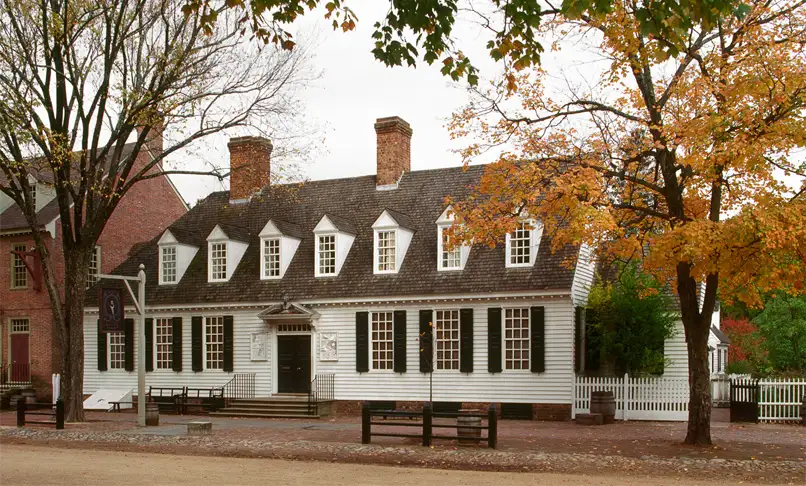Early Days in Virginia
Phi Beta Kappa's first meeting took place on December 5, 1776 in the Apollo Room of the Raleigh Tavern in Williamsburg, Virginia. John Heath, the organization’s first president, aspired to create a serious-minded student society that would offer more than just convivial social opportunities.Phi Beta Kappa’s founders met in secret, to give members the freedom to discuss any topic they chose, no matter how controversial. The regimented curriculum typical of early American colleges allowed little opportunity for this; hence, Phi Beta Kappa’s chosen focus on “literary business,” that is, the holding of discussions and debates. Topics discussed ranged from history (Was Brutus justified in killing Caesar?) to politics (Is religion necessary in government?) to culture (What is the value of theater?).
Notably, the members also debated “the justice of African slavery.” The specifics of their arguments are unknown. Phi Beta Kappa’s early development took place at a time when slavery fundamentally shaped American colleges and the nation’s revolutionary experiment. The uncritical participation in a slaveholding society by many early members reflects a serious moral failing.
Building A National Organization
In the winter of 1781, the College of William and Mary shut down when General Charles Cornwallis positioned the British army on the York peninsula for what became the climactic siege of the American Revolutionary War. This closure might have ended the Society, but for its only non-Virginian member.Elisha Parmele persuaded fellow members to allow colleges in New England to charter chapters. A native of Connecticut, Parmele helped create chapters at Yale in 1780 and Harvard in 1781, ensuring the continuation of the Society. Together with Dartmouth, which received its charter in 1786, these New England colleges formed the earliest collaborative network of chapters at the root of the modern PBK organization.
The first collegiate society identified with a Greek letter name, ΦBK introduced the essential characteristics of others that followed it: an oath of secrecy, a badge, mottoes in Greek and Latin, a code of laws, an elaborate form of initiation, a seal, and a special handshake.
After anti-masonic agitation in 1831 prompted much discussion about the ΦBK oath, Harvard's chapter dropped the requirement for secrecy. This move probably saved the Society from further criticism and also helped to distinguish ΦBK, with its intellectual emphasis, from social fraternities that made their appearance around that time.
It took 100 years before chapters invited the first African Americans or women to participate in ΦBK. The first women were inducted as members at the University of Vermont in 1875, and at Connecticut’s Wesleyan University in 1876. The first African American men were elected at Yale in 1874 and at the University of Vermont in 1877, and the first African American woman was elected at Middlebury College in 1899.
The Society added new chapters slowly and deliberately throughout the nineteenth century, even as the number of colleges in the U.S. expanded rapidly. By 1883, Phi Beta Kappa had chartered 25 chapters. With a critical mass of chapters, representatives from PBK campuses formed the National Council of the United Chapters of Phi Beta Kappa, in the hopes of expanding their national influence. They developed a governing structure that could speak for the values of the Society as a whole and centralize the evaluation and governance of new chapters seeking charters of their own.
Phi Beta Kappa Today
There are now 290+ chapters at American colleges and universities and nearly 50 active alumni associations located in all regions of the country. The most recent additions include Rollins College, University of North Carolina - Charlotte, and Providence College.The Society’s Triennial Council, its legislative body, convenes every three years to carry out the business of the Society. At its 2018 meeting, this body adopted a resolution articulating the Society’s commitment to diversity and inclusion and incorporated it into the Society’s strategic plan. We recognize that the Society needs to do much more.
As we approach the upcoming 250th anniversary of Phi Beta Kappa, we continue to examine our history and our responsibilities. The Society is developing action steps to take now and in the future, to ensure that we affirm our values with concrete actions that are visible to our members, chapter institutions, and undergraduate students.
Source: Richard N. Current, Phi Beta Kappa in American Life: The First Two Hundred Years (Oxford University Press, 1990).



